Looking for a natural and effective way to clean your home? Learn about the benefits of using citric acid as a cleaning agent and discover easy DIY recipes to make your own cleaning solutions.
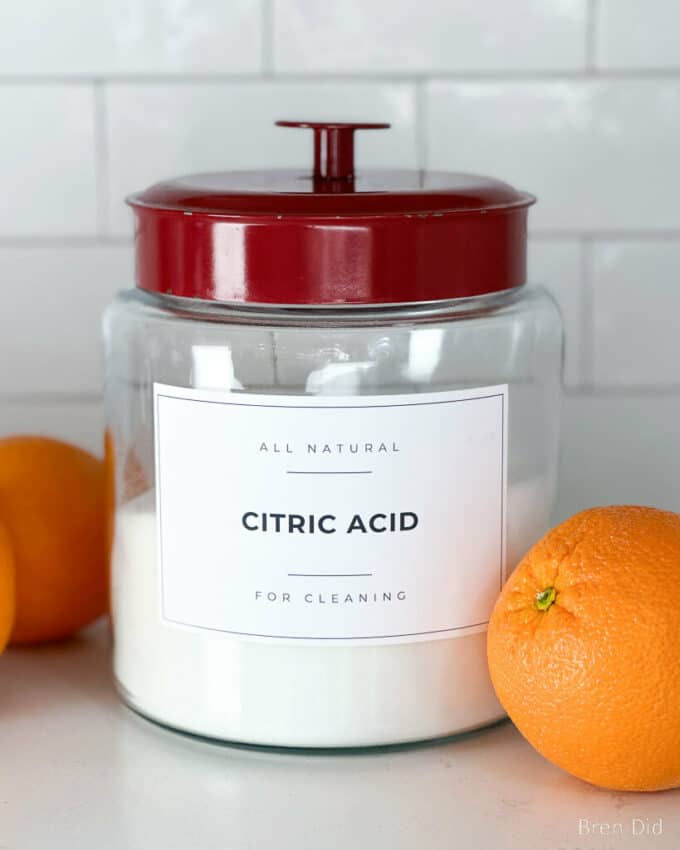
Citric acid (as the name implies) is an acidic cleaner that can be used all over the home. It can be used for cleaning bathrooms, making a descaling solution for coffee pots and kettles, as a dishwasher rinse aid, and MORE. It’s a versatile alternative to vinegar that’s worth considering for your next cleaning project.
Keep reading to learn all about using citric acid for cleaning, the do’s and don’t, and get a few great citric acid cleaner recipes- it’s a go-to green cleaning ingredient that’s easy on your wallet, safe for you and the environment, and less stinky than vinegar.
Jump to:
What is Citric Acid?
Citric acid is a natural acid found in a variety of fruits (most commonly citrus fruits such as lemons and limes). Citric acid can also be manufactured through a fermentation process using bacteria.
It is commonly sold in the United States as a white crystalline powder for use in canning and home brewing. In other parts of the world, boxes of citric acid are sold for cleaning and descaling.
Because of its natural acidity, citric acid has a wide range of applications:
- In the food industry, it’s used as a flavor enhancer in food and beverages (it’s safe to eat in small quantities).
- In the cosmetic industry, it’s used to brighten skin, balance pH, and as a preservative.
- In the cleaning industry, it’s used as an acidic cleaning agent.
How Citric Acid Works
Understanding how citric acid works helps explain its multiple cleaning applications:
It’s acidic – When it’s mixed with water, citric acid creates an acid solution that can break down various substances, such as minerals in hard water stains or soap scum, making them easier to remove. This process is also known as descaling.
It’s a chelating agent – Citric acid can bind to metal ions like those found in rust. As citric acid binds to the iron oxide, it weakens the bonds holding the rust together, causing it to disintegrate. It also binds to metal ions that lurk in hard water for easier removal.
It’s a whitening aid – Citric acid’s acidic properties allow it to whiten or bleach surfaces by breaking down stains and discoloration. It also lowers the pH of water, which enhances the activity of other cleaning agents, such as detergent.
It’s a sanitizer – Citric acid is a food-safe, organic acid that can be used to sanitize food contact surfaces and other household surfaces. Its natural acidity disrupts the cell membranes of microorganisms to destroy or inactivate pathogenic microorganisms.
Is It Environmentally Friendly?
Citric acid is considered environmentally friendly for several reasons.
- It is a naturally occurring compound found in citrus fruits and lemon juice, making it biodegradable and non-toxic.
- It can be produced through fermentation processes using renewable resources.
- Citric acid is an effective alternative to harsh chemicals, making cleaning products safer.
Overall, citric acid’s natural origin, biodegradability, and low toxicity make it a good choice for environmentally conscious consumers.
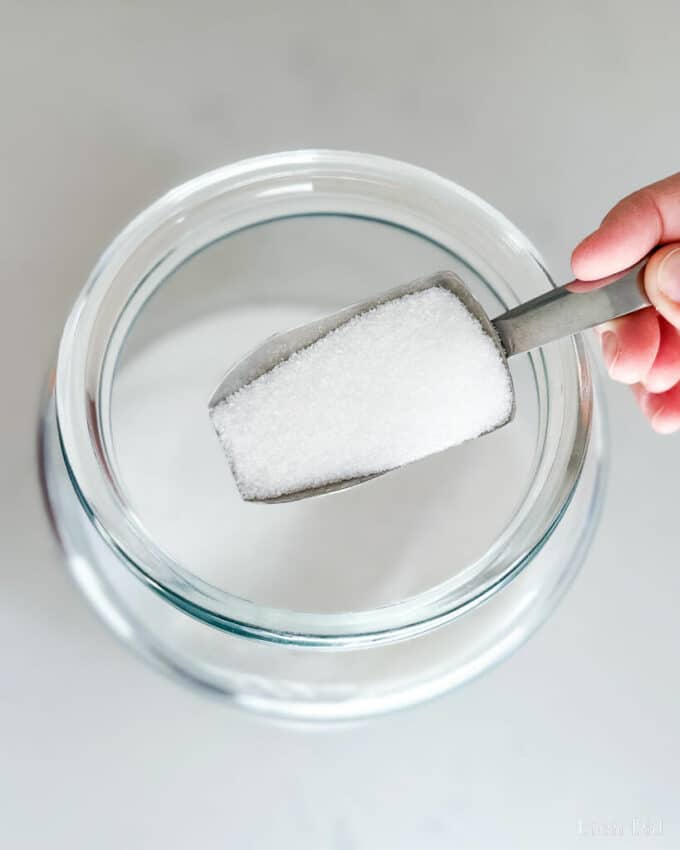
Cleaning with Citric Acid Dos and Dont’s
Cleaning Safety
Citric acid is a natural cleaner, but it is also an acid – safety should always come first when using it. Here are some precautions to keep in mind:
- Wear gloves to prevent skin irritation.
- Avoid eye contact or wear protective eyewear to prevent eye irritation.
- Properly ventilate when cleaning to avoid inhaling citric acid dust or fumes.
- Store out of reach of children and pets to prevent accidental ingestion.
- Never mix citric acid with bleach or ammonia; it can produce harmful gases.
- Do not combine with alkaline cleaning ingredients such as baking soda; they cancel each other out.
- Do not combine with natural soaps such as castile soap; the acid breaks down (unsaponifies) the soap.
What Can You Clean With Citric Acid?
Citric acid can effectively clean a wide range of surfaces and household items, such as:
- Dissolve limescale (aka calcium deposits), soap scum, and hard water stains from sinks, faucets, showerheads, and toilet bowls.
- Tackle grime on countertops, stovetops, stainless steel appliances, and inside kitchen appliances like microwaves and refrigerators.
- Descale dishwashers, washing machines, tea kettles, and coffee machines to keep them running smoothly.
- Freshen and brighten laundry by adding citric acid to the wash cycle. Soften laundry by adding a citric acid solution to the rinse cycle.
- Remove water spots from drinking glasses, windows, and shower doors.
What Shouldn’t You Clean With Citric Acid?
There are some household surfaces you should AVOID using citric acid on. Steer clear of:
- Natural stone surfaces like marble, granite, or limestone – it can cause etching or discoloration.
- Aluminum – it can cause pitting or corrosion.
- Delicate or easily damaged surfaces like wood, brass, or plated metals – it can cause corrosion or discoloration.
Always perform a spot test in an inconspicuous area before using citric acid on a new surface to ensure compatibility.
Where To Buy Citric Acid for Cleaning
In the United States, citric acid is sold in small quantities in the canning section of grocery stores as a preservative. It’s sold in larger quantities at home brewing stores, natural food stores, zero-waste shops, and online for cleaning purposes. Look for bulk citric acid, as larger packages often offer better value.
How to Store
Citric acid should be kept in an airtight container away from heat and moisture to prevent clumping and deterioration. Citric acid will stay fresh and effective for years. Get a free printable label here.
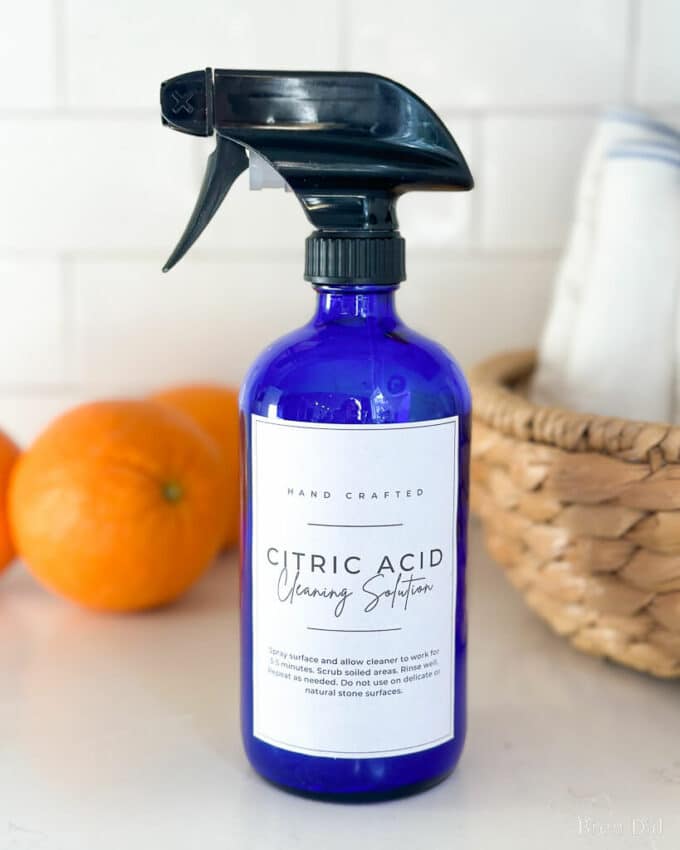
How to Prepare a Citric Acid Cleaning Solution
To make your own citric acid cleaning solution, dissolve powdered citric acid in warm water.
Ingredients and Equipment
- 2 tbsps (20g) Citric Acid powder
- 2 cups (16 oz) Warm Water
- Glass measuring cup or spray bottle
- Spoon
Instructions
- Measure the citric acid powder into a glass bowl or spray bottle.
- Heat the water until it is warm but not quite boiling. The heat will help the citric acid dissolve more easily.
- Add the water to the glass container with the citric acid powder.
- Stir or swirl the mixture gently until the citric acid is completely dissolved.
- Once dissolved, you may use the solution immediately to clean or allow it to cool before using it in DIY cleaning recipes.
Tips
These tips will help you make the most of your citric acid cleaner:
- This mixture (2 tbsp citric acid to 2 cups water) achieves the approximate acidity level of 4% white vinegar.
- Rinse surfaces thoroughly with water after cleaning to remove any residue.
- Make sure to label the container clearly. Get a free printable label here.
- Store any unused solution in a cool, dry place for future use.
- If the solution sits undisturbed for a long period, shake or swirl the bottle to dissolve the citric acid crystals.
Ways to Use Citric Acid for Cleaning
Citric acid is a useful green cleaner. Here’s how to use citric acid for cleaning tasks throughout the home.
Descale
- Aid the Dishwasher: Before washing dishes, add a tablespoon of dry citric acid-based rinse aid to the bottom of the dishwasher or detergent compartment. This helps remove food debris and hard water spots, leaving dishes shiny and streak-free.
- Clean a Coffeemaker: Dissolve 1-2 tablespoons of citric acid powder in a pitcher of warm water, fill the coffeemaker water reservoir, and run a brewing cycle without coffee grounds or filter. Repeat the cycle twice with clean water to rinse out any remaining cleaning solution. Get full directions to clean coffee maker with citric acid.
- Deep Clean Washing Machine: Add ½-1 cup of citric acid to the machine drum and run a long wash cycle with the hottest water setting. The acid will dissolve buildup, including soap scum, hard water stains, and mold/mildew.
- Shine Bathroom Fixtures: Remove soap scum and hard water marks from shower heads and faucets by creating a solution of one teaspoon of citric acid and one cup of warm water. Place the solution in a baggie, attach it to the shower head or faucet with a rubber band, and allow it to soak for up to an hour. Wipe away hard water buildup and rinse thoroughly.
- Clean Electric or Stovetop Kettle: Add 1 to 2 tablespoons of citric acid to the kettle, then fill the tank to the maximum line with water and bring it to a boil. Let the hot mixture soak for 15 to 20 minutes, then pour out the water. Scrub the inside of the kettle as needed, rinse with clean water, and air dry.
Remove Stains
- Whiten Laundry: Add 1/4 to 1/3 cup of citric acid to the washing machine along with your regular laundry detergent. The citric acid helps to brighten whites, remove detergent buildup, and fight tough stains, leaving your laundry looking fresh and clean.
- Clean and Sanitize Reusable Water Bottles/Coffee Cups: Fill the bottle or cup with hot water and add a teaspoon of citric acid. Let it sit for an hour, then scrub with a bottle brush or sponge. Rinse thoroughly with clean water to remove any citric acid residue and sanitize the container.
- Remove Stains from Food Storage Containers: Create a paste using equal parts citric acid and water. Apply the paste to the stained areas of the container and let it sit for 15-20 minutes. Scrub the stains with a sponge or brush, then rinse thoroughly with water.
Sanitize
- Clean and Sanitize Toilet Bowl: Create a simple acidic bathroom and toilet bowl cleaner by mixing citric acid, hand-washing dish detergent, and hot water in a spray bottle. Use inside showers, sinks, bathtubs, and toilet bowls that are easy to rinse. Do not use on natural stone. (Learn how to make citric acid toilet cleaner and get a free label.)
- Sanitize Wooden Kitchen Tools and Cutting Boards: Create a solution using 1 tablespoon of citric acid per cup of warm water. Dip a clean cloth or sponge into the solution and wipe down wooden surfaces. Allow the solution to air dry to sanitize the surfaces effectively.
- Loosen Buildup and Clean Microwave: Fill a microwave-safe bowl with two cups of water and 1 tablespoon of citric acid. Place the bowl in the microwave and heat on high for 2-3 minutes or until the water boils. Allow the water to cool in the microwave, then remove the bowl, dip a cloth in the hot solution, and use it to wipe the interior clean. The steam created will loosen food splatters and grease, making them easier to wipe away. If the steam does not loosen the food on the first try, microwave it for a few more minutes, making sure there is water in the bowl.
- Deep Clean Food Contact Surface Areas: Mix 2 tablespoons of citric acid with 1 cup of water in a spray bottle. Spray the solution onto countertops, refrigerator shelves, etc., and allow it to sit for 10-15 minutes. Wipe down the surfaces with a clean cloth or sponge, and rinse with a clean cloth dipped in warm water to remove any residue.
Clean Metal
- Polish Stainless Steel Appliances: Create a citric acid solution of one tablespoon of citric acid powder with two cups of hot water in a spray bottle. Spray the appliances, then wait three to five minutes before wiping away the cleaning solution with a clean, damp cloth, and rinsing with a damp cloth. Buff with a dry, soft cloth in circular motions to remove fingerprints and restore shine for optimal results.
- Deep Cleaning Oven Racks: Fill a bathtub or large sink with enough hot water to cover racks and dissolve 1/2 cup of citric acid. Submerge oven racks and let soak for several hours. Scrub with a rough sponge or stiff brush to remove baked-on grease and grime, rinse thoroughly with water, and dry before returning to the oven.
- Remove Rust from Garden Tools: Fill a large bucket with hot water and citric acid, approximately 1/2 cup per gallon, and stir until dissolved. Submerge rust-affected parts and soak for no more than an hour; look for bubbles that indicate acid activity. Periodically scrub parts to remove rust efficiently. Rinse, dry, and apply mineral oil immediately to prevent flash rust.
5 Commercial Cleaning Products to Try
Try these products if you’re interested in using citric acid for household cleaning but don’t want to make homemade cleaners. Each contains citric acid and is a safer alternative to many commercial cleaners.
- Dishwasher: Lemi Shine Dish Detergent Booster effectively removes food debris and hard water deposits, while Seventh Generation Dishwasher Rinse Aid ensures spotless, streak-free dishes.
- Toilet Cleaner: 365 Citrus Toilet Bowl Cleaner, ECOS Toilet Cleaner, and Mrs. Meyer’s Clean Day Toilet Bowl Cleaner utilize natural acids to eliminate germs and hard water buildup.
- Descaler: Keurig Descaling Solution is an excellent citric acid descaler for coffee makers or kettles, efficiently removing mineral deposits with just water and natural acid.
- Surface Cleaner: ECOS All-Purpose Cleaner and Blueland Multi-Surface Cleaner offer versatile cleaning and sanitizing solutions for various surfaces, from the kitchen to the bathroom.
- Laundry Aids: Lemishine Washing Machine Cleaner maintains your washer’s cleanliness between loads, while The Hate Stains Co. Emergency Stain Remover Spray effectively pretreats laundry stains.
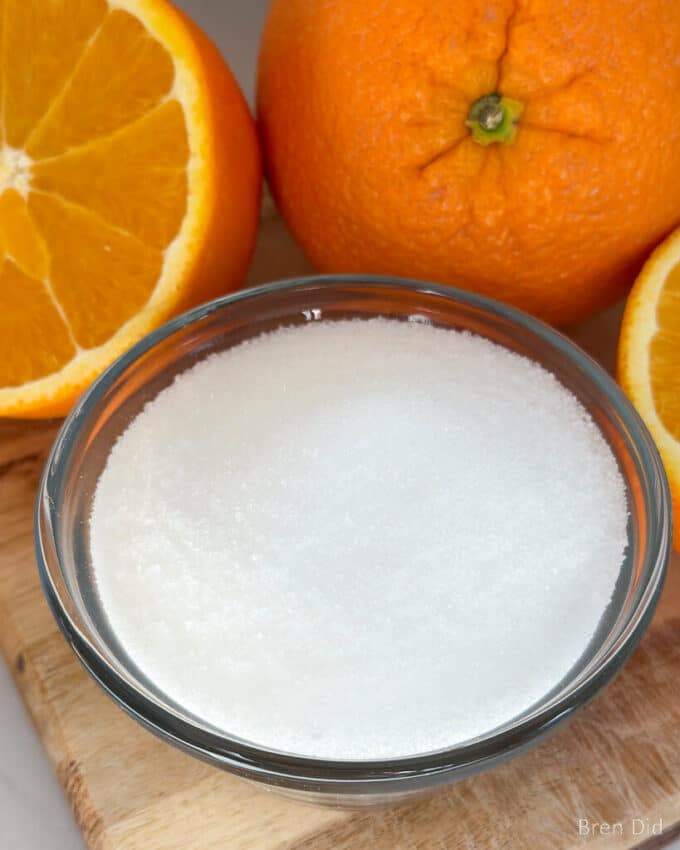
Citric Acid vs Vinegar
Vinegar (which contains acetic acid) is celebrated for its effectiveness in the green cleaning world, while citric acid is a great alternative that is often overlooked.
Citric acid has several advantages over vinegar:
- Citric acid cleaners have a milder scent compared to vinegar, which can be overpowering for some.
- Dry citric acid requires less plastic packaging and occupies minimal cupboard space compared to liquid vinegar.
- Due to its lighter weight, the powder form of citric acid consumes less energy during shipping compared to vinegar.
How to Substitute for Vinegar
To replace white vinegar in cleaning solutions, dissolve 2 tablespoons (20g) of powdered citric acid in 2 cups (16 oz / 0.5 L ) of warm water. This mixture has a similar acidity level as 4% white vinegar, ensuring effective cleaning results.
What cleans better, vinegar or citric acid?
Both citric acid and vinegar are effective natural cleaners; the choice between the two depends mostly on personal preference. Some users prefer citric acid over vinegar for cleaning because its chelating properties help break down minerals in hard water stains or rust, it has a milder scent than vinegar, and it’s easy to mix to different concentrations.
FAQ
Citric acid has bactericidal ability – its natural acidity disrupts the cell membranes of microorganisms, which kills them or inhibits their growth – and is used as an active ingredient in EPA Certified Sanitizers and Disinfectants.
Yes, but it’s not necessary since both are acidic cleaners. For a stronger acidic cleaner, make a cleaner with a higher concentration of citric acid by dissolving more citric acid crystals in plain water, or purchase a vinegar with a higher concentration of acetic acid, such as cleaning or pickling vinegar.
Citric acid can be mixed with varying amounts of water to create a solution with acidity levels similar to, stronger than, or weaker than vinegar. However, it might be more effective for certain cleaning tasks due to its chelating properties, which help break down hard water stains containing iron and rust.
Yes, citric acid is a great option for cleaning toilets. You can create a simple citric acid toilet cleaner by mixing 6-8 tablespoons of citric acid, 1 tablespoon of hand-washing dish detergent, and 1 cup of hot water in a spray bottle. This solution effectively helps remove stains and hard water buildup in the toilet bowl. Do not use on natural stone.
Love learning about green cleaning ingredients and DIY cleaners? Sign up for my newsletter below and never miss a thing!



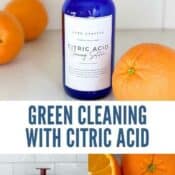
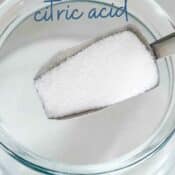
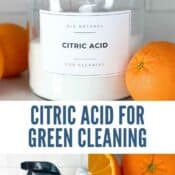
Leave a Reply